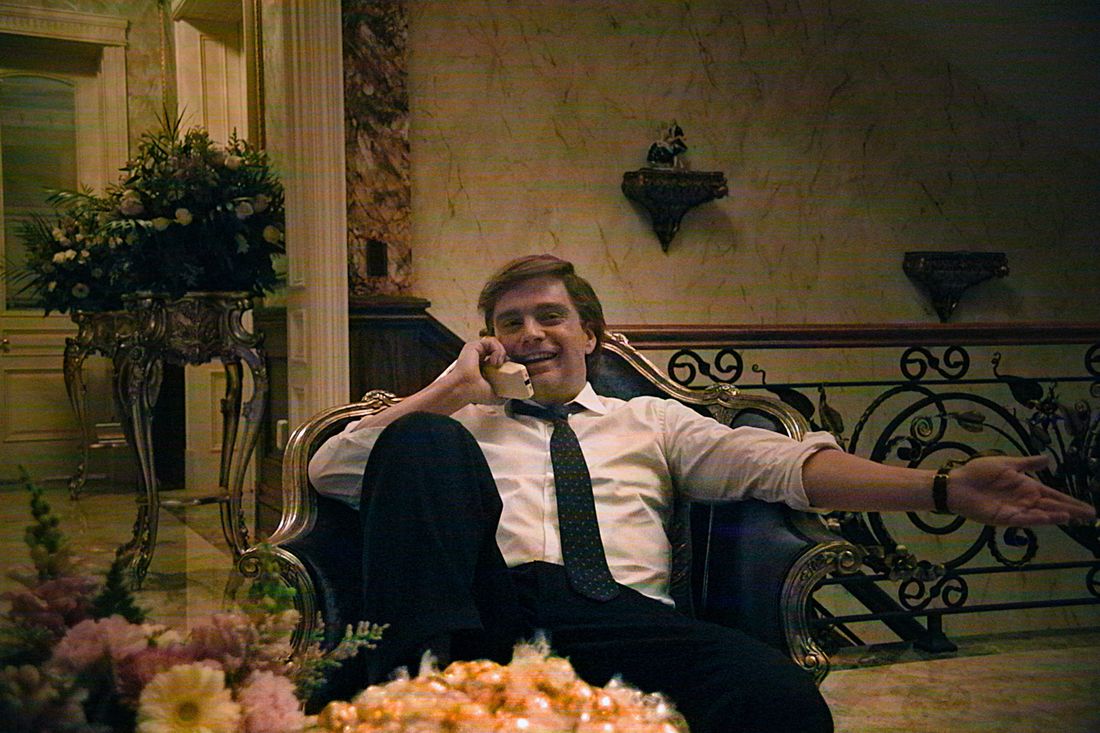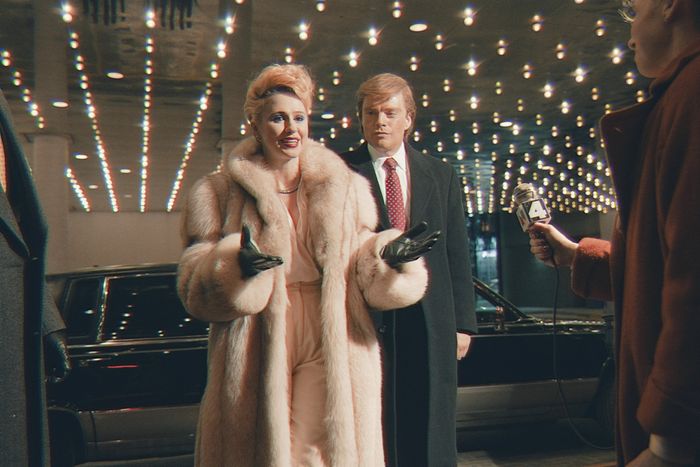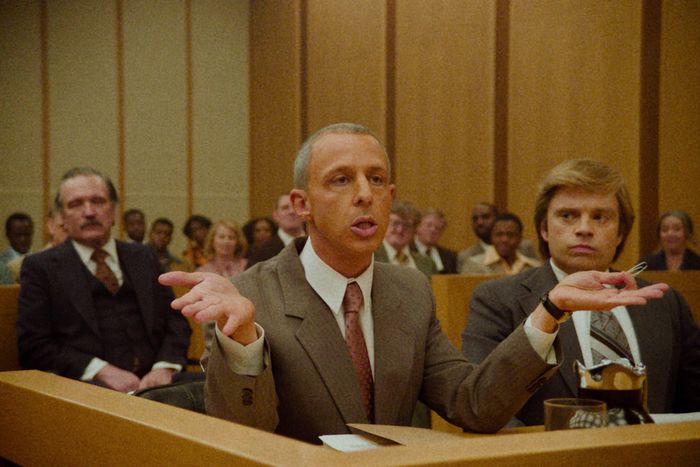
This article was featured in One Great Story, New York’s reading recommendation newsletter. Sign up here to get it nightly.
Whether you regard the breathless clock watching of standing ovations at film festivals as an accurate indicator of cinematic excellence or not, by all accounts, The Apprentice received nothing short of a marathon reception at the Cannes Film Festival this May. The Donald Trump hot-button biodrama brought a premiere audience to its feet for either eight minutes of sustained applause (according to Variety), “a nearly 10-minute standing ovation” (ET), or 11 full minutes (Deadline). The $16 million independently financed feature fiercely divided critics on the Croisette — the Times of London hailed it as “full of compassionate feeling yet ruthless in analysis,” while Vulture’s Bilge Ebiri complained the movie “gets dumber as it goes along” — and drew “audible gasps” from premiere attendees for a scene in which Trump (played by Sebastian Stan) throws his wife Ivana (Oscar nominee Maria Bakalova) to the ground and rapes her.
Within hours of the movie’s debut, the 45th president’s spokesman Steven Cheung issued a public statement castigating The Apprentice as “pure malicious defamation” that “doesn’t even deserve a place in the straight-to-DVD section of a bargain bin at a soon-to-be-closed discount movie store.” The next day, Trump attorneys issued a cease-and-desist letter addressed to screenwriter Gabriel Sherman and director Ali Abbasi, the Danish Iranian filmmaker behind the previous Cannes sensation Border, warning the filmmaking team not to seek a North American distribution deal at threat of lawsuit. “So we get this letter and it’s written in this strange, inflammatory language that’s not really for us — it’s for his base,” Abbasi explains. “Part of me is laughing, like, Bring it on. Sue us. The other part of me is like, Wait a second, this can actually ruin my life.”
Arriving during an election year, timed to hit 1,500 multiplex screens less than five weeks before polls open, the fact-based film (written by former New York Magazine writer-editor Gabriel Sherman, who chronicled the Trump political ascendancy leading up to the 2016 election) has plenty to keep MAGA advisers up at night. An ’80s-set coming-of-age story, it chronicles Trump’s mentor-protégé relationship with notorious legal fixer Roy Cohn (portrayed with zombie-eyed fury by Succession’s Jeremy Strong), the Machiavellian McCarthyite who transformed the Donald from a doofus developer into a real-estate mogul–cum–tabloid mainstay whose best-selling The Art of the Deal made him the face of American business sang froid. Cohn’s code of professional conduct boils down to three simple rules that will ring familiar to anyone attuned to the former president’s handling of legal turmoil or refusal to accept 2020’s election outcome: (1) Attack, attack, attack; (2) Admit nothing, deny everything; (3) No matter what, claim victory and never admit defeat.
Along the way, we see the future commander-in-chief pop amphetamine pills like Tic Tacs, experience erectile dysfunction, cut a deal with Mafia mobsters to build a skyscraper, undergo liposuction, and receive scalp-reduction treatment for baldness — all in addition to the nonconsensual-sex sequence, which the filmmakers like to remind you is based in reality. (In a sworn divorce deposition from 1990, Ivana alleges Trump raped her. Under pressure, she later recanted her statement during his first presidential run, and she died in 2022.) All of which has combined to put The Apprentice in a kind of cultural purgatory. Conservative commentators have railed against the film sight unseen as a liberal hatchet job intended to defame Trump ahead of a closely contested election. Progressive-minded entertainment-industry execs who saw the film at the Toronto and Telluride Film Festivals have told me they privately despair The Apprentice goes too far in “humanizing” its subject — making the movie a harder sell in liberal-leaning cities where The Apprentice will likely find its most appreciative audience.
After Cannes, almost every studio and streamer passed on acquiring the film’s North American distribution rights until scrappy start-up Briarcliff Entertainment bought the movie in late August. And even then, producers struggled mightily to get out from under their original majority investment deal from Kinematics, the production company financially backed by billionaire NFL team owner and Trump supporter Dan Snyder — who was reportedly apoplectic upon discovering the film’s approach to its subject and rape scene. The Apprentice team went as far as launching a Kickstarter campaign to get the film in front of theatrical audiences. (It pulled in $407,486 on a goal of $100,000.)
Given its difficulty finding distribution, executive producer and original development executive Amy Baer points out the absurdity of calling the movie a well-timed political hit piece. “This started seven years ago,” says Baer, who commissioned Sherman’s script all the way back in 2017 and hired Abbasi onto the project a year later. “So if Gabe, Ali, and I thought this film would align perfectly with the presidential election — where the defeated Donald Trump, who lost in 2020, was going to run again — the three of us would be the most successful humans in Hollywood.”
“This movie has something new to say about its subject matter; it’s got a different perspective than people are used to,” adds Apprentice producer Dan Bekerman. “This movie is not a political attack on anyone.”
Back in 2017, at a time when half of America was still reeling from Trump’s shock ascension to the presidency, Sherman was adapting The Loudest Voice in the Room, his biography of Fox News president Roger Ailes, into a limited series for Showtime. Having covered the presidential campaign in depth, Sherman had become fascinated with the Cohn-Trump relationship. “It just came to me in a flash,” Sherman says. “That’s a movie: the origin. How Roy imparted his wisdom of the dark arts to Donald.”
Independently financed films move from conception to completion at their own ineluctable speed. Baer, who managed a small development fund, bought the script in an effort to “process what just happened” election-wise as well as to “understand culturally what Trump represented that so many people voted for.” In 2018, she began courting Abbasi for the project, convinced a director not from the U.S. could bring much-needed “outsider” perspective to a uniquely American political predicament. Living in Denmark at that time and prevented from traveling to the Telluride Film Festival to promote Border by Trump’s so-called Muslim Ban, Abbasi was initially underwhelmed by Sherman’s screenplay. “I was like, Okay, humanistically, this is great. But I’m not sure politically. This is almost too ambivalent,” the director recalls.
But over the course of negotiations, he revised his view. “Gabe and Amy are taking such a huge risk because not only are they doing this movie about their own sitting president — in its most sympathetic version, the movie is fairly critical of him — but they are also operating inside the liberal Establishment of Hollywood,” Abbasi says. “Which would probably look down on them for doing this for many reasons. So I was like, This is actually quite good.”
After Trump lost in 2020, The Apprentice came close to landing independent backers and seemed poised to move forward. But the former president’s obeisance to Cohn’s Rule No. 3 — claim victory, never admit defeat — dealt the project a setback. “January 6 definitely delayed the start of the movie by at least a year because it scared everyone in the creative community about financing a Trump movie at that point,” Sherman says.
Even as Abbasi prepped his third feature, the Persian-language crime thriller Holy Spider, he continued to audition actors for The Apprentice’s lead. Sherman’s script found its way to Emmy and Golden Globe winner Stan, who won acclaim in previous biographical roles playing Mötley Crüe rocker Tommy Lee in the Hulu miniseries Pam & Tommy and Jeff Gillooly in I, Tonya. Stan personally contacted the director about playing Trump. By then, the filmmakers had crystal-clear ideas of what they did and didn’t want for the role. “We were very mindful about never wanting this to be caricature-ish,” says Baer. “There were so many spoofs and comic versions of Trump.” Adds Abbasi, “Sebastian has this uncanny ability. He is almost specialized in getting douchebags to feel likable. They’re still flawed. But you feel them flesh and blood.”
Stan’s involvement was kept secret even as the production team (represented by the London-based firm Rocket Science in conjunction with Hollywood talent agencies WME and CAA) traveled to Cannes in 2022 seeking to presell international distribution rights. Scythia Films, the Canadian production company behind such titles as the 2015 art-house horror hit The Witch and this year’s Sundance entry My Old Ass, boarded the project and structured financing from Ireland, Denmark, and Canada. Another production company, Kinematics, stepped in to contribute around $8 million of The Apprentice’s $16 million budget, becoming its largest investor.
Although his name is listed nowhere in its company credits nor on The Apprentice’s 43-name roll call of producers, billionaire former Washington Commanders owner Dan Snyder — a brash, big-spending crank regarded as one of the most unscrupulous owners in the history of professional sports — is the financial engine behind Kinematics; he provided millions of dollars in loans to bankroll the operation, and his daughter Tiffanie is married to the company’s co–chief executive Mark Rapaport (who wrote and directed two of Kinematics’ three previous credits). Snyder also contributed $1.1 million to Trump’s inaugural presidential committee and $100,000 to his 2020 reelection campaign.
Throughout production on the film (which took place in Canada last year), Snyder remained largely oblivious as to what was being filmed. But the billionaire was hardly thrilled by a rough cut of the movie he screened at his Caribbean vacation home in early 2024 that included a homoerotic fantasy sequence in which Strong’s character wears a skintight frog costume, climbs into bed with Stan, and caresses his face. The frog sequence did not make the movie’s final cut (according to one source, it “looks silly” and “belongs to a different movie”). However, it was another scene that elicited Snyder’s ultimate displeasure: The Apprentice’s rape scene, which takes place about five-sixths of the way through the movie. Kinematics declined to comment for this story, and a lawyer for Snyder did not respond to an interview request from Vulture.
According to one international source with knowledge of the project’s development, The Apprentice’s most infamous scene was not written as a rape. In an early draft, this source tells Vulture, the early parts of the scene featured no sex but rather a physical altercation after Ivana ridicules Trump for having undergone a surgical treatment for baldness. The sequence later transitioned to “rough” but consensual sex in a bedroom. Then during production, the scene evolved from rough sex on the floor immediately following the argument to outright rape. Sherman declined to comment on the matter. But according to three other sources with extensive knowledge of the production process, the scene was always conceived and intended as a rape. Stage direction specifically describing Trump as he “rips open Ivana’s robe and forces himself inside,” existed in every version of the screenplay and was signed off upon by all the movie’s financial stakeholders (most notably Kinematics). According to these people, the sequence — which is based on Ivana Trump’s sworn divorce deposition and characterized in the 1993 book The Lost Tycoon — was “considerably more violent” in earlier drafts of the script (with Trump shown ripping out a clump of Ivana’s hair before raping her and tearfully apologizing) and was toned down during The Apprentice’s search for financial backing.
Contrary to published reports, sources close to the production say Snyder did not attempt to block The Apprentice himself. But Kinematics executives Rapaport and Manny Nunez demanded changes; specifically, the rape sequence had to go. The executives were contractually entitled to a “mutual final cut,” sharing approval with Abbasi for the edited version of the movie going into public release. The director made other alterations to the film but refused to remove the rape scene (by then whittled down to ten seconds). So just weeks before The Apprentice would premiere in competition at Cannes, Kinematics sent producers a cease-and-desist letter to prevent their own film from playing at the festival.
As that fracas played out behind the scenes, The Apprentice arrived in France with distribution presold in a number of countries but still seeking a North American deal. “Going into Cannes, we had huge interest,” Bekerman says, adding that at the premiere screening, “it was something close to ecstatic. People talk about the 12-minute standing ovation. But Ali actually interrupted it and started to make his speech. So I don’t know, it might have been 20 minutes if he hadn’t stopped it! And then we saw online that Trump’s campaign is calling us ‘fake’ filmmakers. But more importantly, threats start coming in from the campaign against any distributor who would dare release this movie.”
Netflix, Amazon, and Apple quickly passed. Studios including Neon and A24 kicked the project’s tires but didn’t make a deal. According to a source close to the production, Sony Pictures Classics said the film “wasn’t for them.” Another source privy to negotiations in Cannes tells me potential distributors admitted feeling gun-shy about “buying a lawsuit.” “From the Trump campaign side, they were quite deliberate,” Abbasi says. “They knew what they were doing. They were actually trying to ruin it for us.”
Unable to resolve their creative differences with Abbasi and dreading the PR fiasco of releasing the film without the support of its director, execs at Kinematics proposed a buyout, hoping to offload its stake without losing money on the deal. Fred Benenson is a tech investor and founding employee of Kickstarter who executive-produced such quirky indie projects as Sasquatch Sunset and the 2019 documentary The Emoji Story. Ahead of Cannes, he helped finance postproduction costs for The Apprentice’s sound editing and VFX. Then after Cannes, Benenson stepped in to begin facilitating a financial exit from the Kinematics deal. In the absence of studio-distribution prospects for The Apprentice, he used his connections to help set up the Kickstarter campaign to pay for marketing costs and independent-theater rentals (a somewhat ignominious process called “four-walling”), ensuring the movie would receive at least a token release ahead of the election.
Then in August, Benenson and the “boutique studio” Rich Spirit agreed to take over Kinematics’ stake, teaming up with fledgling art-house distributor Briarcliff Entertainment to theatrically release The Apprentice on October 11. The film has already had its New York premiere, at which Rich Spirit producer James Shani encouraged people “to please talk about the movie. Please post about it on socials.” (Conservative political consultant and former Trump ally Roger Stone has already done so: “The portrayal of Roy Cohn by actor Jeremy Strong in the new movie The Apprentice is uncanny in its accuracy,” he wrote on X.) According to prerelease “tracking” estimates, the film is set to take in between $4 million and $6 million over opening weekend. As veteran analyst David A. Gross, who publishes the newsletter FranchiseRE, points out, indie films tend to disproportionately rely on their studio distributors to “activate” audiences, and it remains uncertain “how strong Briarcliff will be” in that department, in which case word of mouth will be contingent on the “controversy of the subject matter.”
The former president has since given no indication he plans to move on his legal threat as the movie reaches theaters, but the filmmakers have planned to reserve at least some of those Kickstarter funds to fight off potential lawsuits. With critical consensus now heaping particular praise on the performances of Stan and Strong — but also more generally acknowledging that “the most disturbing aspect of The Apprentice is how familiar it all is by now and how numb we are to its depravity” — Baer and Abbasi still sound shell-shocked by the movie’s long odyssey to the screen.
“My big worry is we get buried in this legal avalanche,” says Abbasi. “The guy has I don’t know how many lawyers on his payroll. They gotta do something for him. They gotta sue someone.”
More on The Apprentice
- No One Is Afraid of The Apprentice
- The Apprentice Gets Dumber the Longer It Goes On
- Release the Frog Cut of The Apprentice




